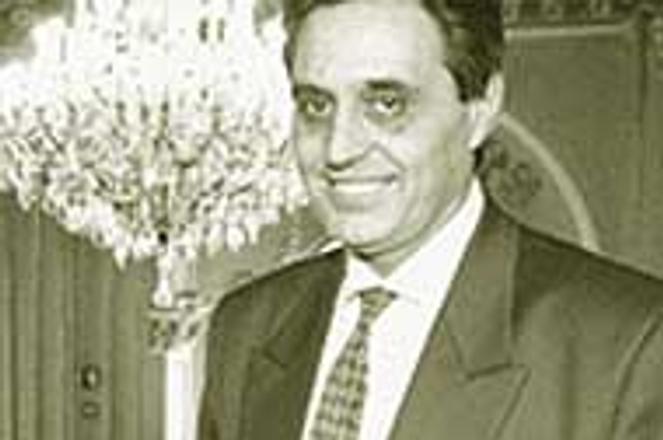Slovak businessman Jozef Majský said that firms participating in state tenders expect personal relationships and "past deals" to play a role in who is ultimately awarded the tender.photo: Spectator Archives
"The Slovak government is being influenced by Slovak economy lobbyist groups," said Speaker of Parliament Jozef Migaš April 2 on Slovak Television's weekly debate forum Five Minutes till Twelve. "And it's no good for the country."
Migaš's strong words were levied at two groups in particular - M.E.S.A. 10, an economic think-tank founded in the early 90's by Deputy Prime Minister for Economy Ivan Mikloš, and the G7, an unofficial group of seven media and big industry representatives. While the accused enterpreneurs immediately refuted the allegations, at least one analyst agreed with Migaš.
Anton Marcinčin, an economic analyst with the Slovak Foreign Policy Association, said that Slovak enterpreneurs did indeed enjoy power over politicians, although he disagreed with the groups Migaš called out. "I agree with Migaš, but I don't agree with the groups he mentioned," he said.
Marcinčin compared the Slovak economy to 'crony-capitalism', a term referring to an economy based on personal relations between politicians, bank managers and company owners. "It's an absolutely different understanding of economic norms," he said. "Americans prefer strong and transparent rules, while Europeans accept the 'human' aspect of economy [where personal relationships are also considered when making a business deal]."
But those accused reacted angrily, and even accused Migaš's SDĽ party of non-transparent practices.
"Migaš's statements were simply idiotic," said František Šebej, Chairman of Parliament's European Integration Comitee and a former M.E.S.A. 10 member. "M.E..S.A. 10 was established in 1992 as a non-governmental economic think-tank with no connection to big businessmen. Mr. Migaš could have easily accused any think-tank of lobbying."
Šebej added that some other business interests, which he refused to specify, had recently attempted to influence the government and that "some of them are supported by the SDĽ, Migaš's mother party."
"I consider it absurd that some politicians and media are making a big issue of the G7," Ján Kasper, a G7 member, agreed in an interview with the daily Sme on April 5. "We created this group [the G7] in 1997 because we weren't satisfied with the way our society was developing at that time. But it doesn't exist now and therefore doesn't have any influence."
Other high-profile businessmen said that while lobbying may exist in Slovakia, the true extent of their inlfuence was limited. "Lobbyism exists and will exist whether its transparent or amateur, based on who is friends with whom," said infamous Slovak businessman Jozef Majský, a non-member of both the G7 and M.E.S.A. 10, on April 4. "But I don't believe lobby groups hold power over politicians. Some businessmen can make some recommendations, but they aren't able to influence principal political decisions."
Marcinčin said that 'crony-capitalism' had thrived under the former government of Vladimír Mečiar, and that the newly elected Dzurinda government should have put a halt to it after the September 1998 elections.
"Immediately after the elections, the government could have investigated, let's say, five privatised companies and then changed their managements," he said. "But there wasn't enough political will to do so. Instead, the new government chose the 'crony' solutions again."
Using connections
While businessmen do not refer to themselves as political lobbyists, they do admit to using their personal relations to influence business activities where decisions are made by people holding politically-nominated business posts, such as chiefs of state companies or ministry representatives.
"Every state offer is attractive for enterpreneurs," said Majský. "Most of those offers are made through tenders. If there are two or three equal project proposals, then we want the government to consider what they owe us in light of past deals."
Kasper separately agreed with Majský telling Sme that "we can not prevent friendly relations, especially in situations where there are several good and equal project proposals in a given tender."
But Marcinčin said that it was hard for him to imagine two or three absolutely equal proposals in a tender. "I would really like to know how much money such 'friendly' decisions cost the Slovak economy," he said.
Businessmen consider corruption to be a much bigger problem than lobbyism. "If each state official signing a state offer wants for at least 5% of the amount to find its way into his pocket, that's corruption, not lobbyism.," Majský said. "But then again, if that's the way it works, I have to play by their rules or the system would destroy me."
For Kasper, the privatisation of states companies is the only way to avoid corruption. "When an institution becomes all or partially privatised, political influence loses its power," he said.
But Marcinčin disagreed, saying that privatising did not represent a magic solution. "We also have to change other economic tools and rules," he said. Marcinčin added that Slovakia's integration into organisations like the OECD and the EU will play an important role in correcting the existing 'crony-capitalism'.
"Dzurinda's government didn't have enough political power to deal fairly with Mečiar's heritage, but the current privatisation steps have to be taken in a proper way," he said. "We'll see how the government does with the bank sector privatisation."


